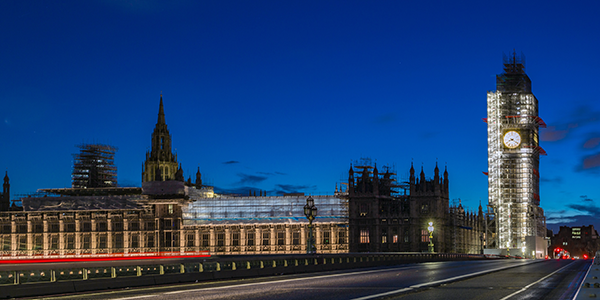Brexit has shown the limits of Britain’s broken ‘Westminster model’ of politics
The results of the recent European Parliament elections demonstrate how the traditional model of UK politics based on two ‘main’ parties is fracturing under the pressures of the Brexit process. Jess Garland sets out some proposals for reforming the system in line with voters’ wishes for a more cooperative style of politics.

Photo by Zhifei Zhou on Unsplash
The Palace of Westminster dates back to the mid-1800s – and since that time remains largely unchanged. Now the structure is fundamentally compromised with antiquated heating, ventilation, drainage and electrical systems; the roofs are leaking, the pipes corroding and plumbing failures regularly cause damage to the interiors. The Parliamentary Buildings (Restoration and Renewal) Bill – currently going through Parliament – hopes to fix this rot.
But there are other pressing structural problems at Westminster that need dealing with. Our failing political system is also causing damage – public trust in our politics is at rock bottom.
New polling for the Electoral Reform Society (ERS) shows that two-thirds of people (67%) feel they have very few or no opportunities to inform and influence the decisions made by MPs at Westminster – and only four percent feel they have a lot of opportunities. People are losing the little faith they had in politics to fix problems and they feel powerless to change things.
The need for a wholesale renewal of our democracy is now more urgent than ever. In a newly published report Westminster Beyond Brexit: Ending the Politics of Division, the ERS sets out a vision for how we can achieve a flourishing democracy where power is dispersed across political institutions and citizens are empowered and engaged.
The Brexit deadlock is not the cause of our constitutional crisis, but rather a symptom of it, and the crisis has exposed the façade of ‘strong and stable’ government – the strength on which the system has been lauded.
Our politics is stuck in a 19th-century system and like the crumbling palace itself, the foundations of UK politics – the Westminster System – is at the root of many of the problems we see today. At the core is a broken two-party system propped up by majoritarian and disproportional elections.
Party fragmentation has pushed this system to its limits. In two of the last three general elections, the system has failed to deliver majority governments, much less stability. This volatility in voter choice has – quite fairly – put the system under strain, resulting in erratic and disproportionate results. The 2017 election saw the second highest aggregate level volatility – the movement of votes between the parties – since 1931 (with the most volatile year being 2015), and with a system unable to accommodate these changes in voter behaviour, results have been unpredictable.
But voter antipathy with the system runs deeper than simply the voting system. The ‘Westminster system’ as a whole – characterised by centralised, two-party politics – is now fundamentally out of kilter with how voters want to be represented today. In both local council elections at the start of the month and recent European elections, we can see how the UK electorate has switched to new and ‘smaller’ parties. The European Parliament elections in particular show a historically low combined vote share of Conservatives and Labour of just 23% – which indicates that voters are not only less closely aligned with the two ‘main’ parties, but wish to support a wider range of parties. When support for parties is so spread politicians need to work together to bridge divides and not be forced into the binary politics of government and opposition.
This oppositional mentality goes against how the public thinks our democracy should work: our research shows that whilst 64% of people think that our political system should encourage cooperation between political parties, only 19% believe that it actually does so.
It is now time to move decisively away from a Westminster model and build a politics that is fit for purpose and brings people, power and politicians together to shape our response to the challenges we face.
In the new report, we set out a map towards remaking democracy at Westminster and bringing citizens into political decision-making. There are two key pillars to the proposals. First, we need to rebalance power at the centre by reforming the unelected and undemocratic House of Lords. An elected second chamber could serve as the forum where representatives from the UK’s nations and localities could gather to discuss national and cross-border issues. Looking at examples from overseas, we can see how a second chamber can represent different territorial interests in the centre.
Second, we need to bring power closer to the people and give them a genuine say in the future of their country and communities. Deliberative democratic processes can ensure that citizens are informed, are able to hear each other’s views in a reflective and respectful environment, and can make decisions that have real impact. These changes are not just institutional, but are centred around a shift in our political culture.
As MPs sign off on plans to fix the physical structures of Parliament, it is time to rebuild our political system too. There is a public appetite for a different kind of politics. We need to remake politics at Westminster to place it on stronger and fairer foundations.
This article gives the views of the author, not the position of Democratic Audit. You can read the Electoral Reform Society’s new report here: Westminster Beyond Brexit: Ending the Politics of Division.
About the author

Dr Jess Garland is Director of Policy and Research at the Electoral Reform Society.





 Democratic Audit's core funding is provided by the Joseph Rowntree Charitable Trust. Additional funding is provided by the London School of Economics.
Democratic Audit's core funding is provided by the Joseph Rowntree Charitable Trust. Additional funding is provided by the London School of Economics.
The piece misses the elephant in the room – the electorate did not go out to vote 10 days ago because they ‘wished’ to vote for other parties and were in some confused existentialist state about the meaning of life or politics. They went out to give a good kicking to the two ‘main’ parties who appear to have lied and lied and lied again to them over Brexit – to such a farcical degree that they appear to almost all voters (even those who voted for them) like furtive criminals caught in the act by the constabulary. They are suddenly critically discredited, having between them achieved 80%+ of the vote only 2 years ago at the General Election
Those that went out are not bothered about systems, and desire for “wholesale renewal”. Only a couple of years ago they went out to vote en masse for those two parties who said they would deliver Brexit (in the end, after crashing around in chaos and a complete mess) by 29 March 2019, latest….and those parties had the biggest combined mandate for that one promise – UKIP of 2015 had ‘done its job’ and the LibDems were an irrelevant embarrassment to all after the disaster of the coalition. The main parties promised in 2017, but it’s pretty clear to most voters now that the parties appear not to have had any intention to deliver departure from the EU: they have patronised and sneered at the electorate, called them all the names under the sun and tried to overturn the 2016 referendum specifically against all their promises. A classic example was Phillip Lee, the fanatical remainer and Conservative MP for Bracknell. When called to account by his party, he airily refused to attend and made extraordinary excuses which were patronising and devoid of fact/proof. In essence he attacked the membership, thumbs his nose at them and the implication is: “it doesn’t matter what you plebs do, I am protected from the hoi polloi by the higher ups”. Great stuff – keep it up ‘chaps’. And then the vote of some tagged criminal Labour MP ends up being crucial in part of this process. No amount of tinkering with systems will deal with this kind of pantomime.
There is the reason for the collapse of the main parties – people did not ‘wish’ to vote for others like The Brexit Party of the LibDems – they were forced to.
Whilst I would not disagree with the main thrust of this article. I find it highly unsatisfactory here that there is no mention of the Boundary Commission.
In 2013 the Lib Dems reneged on their agreement to implement Boundary Commission changes in return for an AV referendum in. Had Parliament been properly constituted with representative constituencies as determined by the Boundary Commission then the Parliamentary arithmetic from 2015 onwards would have been entirely different.
I think this situation should not be disregarded on a website which is entitled ‘Democratic Audit’.
MPs should be reminded that their authority to vote on Brexit issues is somewhat tainted by their failure to accept boundary commission changes and that they should be looking for compromise rather than leveraging questionable Parliamentary arithmetic..
The root cause of this whole mess needs investigating, via the square mile (city of London) and all the Free-masonic links/symbology, to the central (privately owned) bank scam, Fiat money from thin air loaded with debt. Tax on everything even after tax is paid on salary. Usury needs to go end of story!.
All the nonsense these people use with silly symbols like the needle, all seeing eye etc, scrap the lot, kick these control freaks into touch.
There are 99.9% of us, and 0.01% of them, so why does the system serve them not us?
They are no longer public servants, the servants are the public!.
And the classic divide and conquer, division and hatred via false flags too needs to be ended.
There is no and will never be no reason to ensure peoples safety while government benefits via tyranny be enacting new draconian laws and taking more money for supposed security every time a supposed terrorist incident happens, hence the perpetrators are more likely to be government than actual terrorists.
The real terrorists wear suits, and people vote for them!